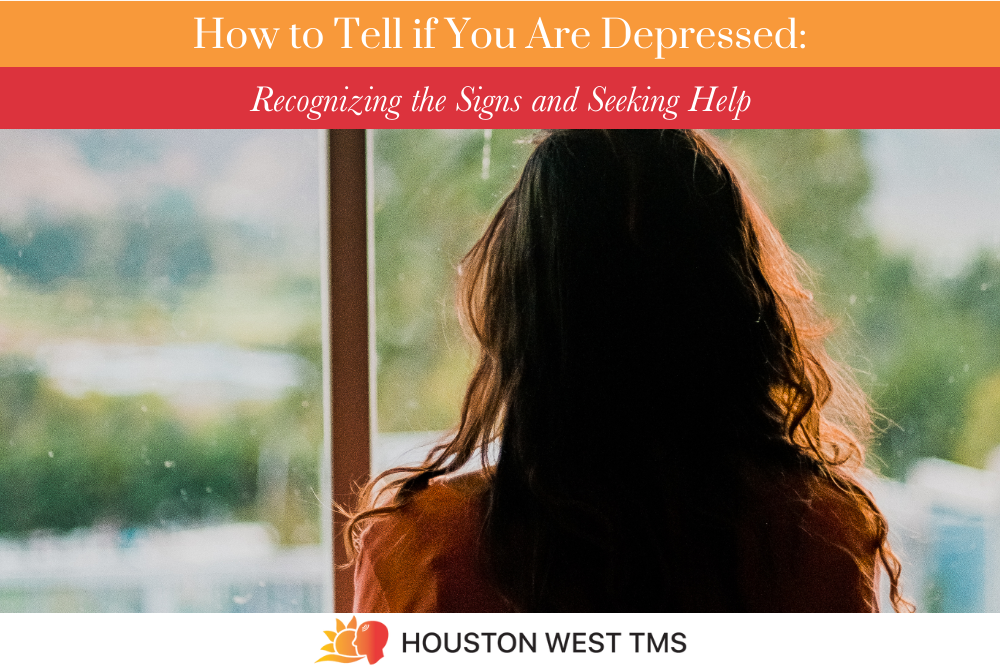 Houston West TMS
Houston West TMS
902 Frostwood Dr. Suite 283, Houston, TX 77024 | Phone: (713) 464-4455
Depression is more than just feeling sad or “off” for a day or two. It’s a serious mental health condition that can affect your thoughts, emotions, physical health, relationships, and ability to function in daily life. At Houston West TMS, we understand how confusing it can be to figure out whether what you’re feeling is just a temporary slump or something more significant. In this blog, we’ll break down the common signs of depression, how to differentiate it from other feelings, and what steps to take if you think you may be suffering from it.
Understanding Depression
Depression (also known as Major Depressive Disorder) is a medical condition that involves persistent low mood and loss of interest in activities that you once enjoyed. It can range from mild to severe and affects millions of people across all age groups.
The good news? Depression is highly treatable. And the first step toward healing is recognizing the signs.
Common Symptoms of Depression
If you’ve been wondering “Am I depressed?”, here are some symptoms to look out for. These must typically be present for two weeks or more to be considered part of a clinical diagnosis:
- Persistent sadness or low mood
- Loss of interest or pleasure in hobbies and activities you once enjoyed
- Fatigue or lack of energy, even after a good night’s sleep
- Feelings of worthlessness or guilt
- Difficulty concentrating or making decisions
- Changes in appetite—either overeating or loss of appetite
- Sleep disturbances—insomnia or sleeping too much
- Irritability or restlessness
- Physical aches and pains without a clear cause
- Thoughts of death or suicide
You don’t need to experience every symptom on this list to be depressed, but if you relate to several of these for most of the day, nearly every day, it’s time to consider seeking professional help.
What Causes Depression?
Depression can be triggered by a combination of factors, including:
- Genetics or family history
- Chemical imbalances in the brain
- Stressful life events such as loss, trauma, or job changes
- Medical conditions (like chronic pain, thyroid disorders, or sleep issues)
- Hormonal changes
- Substance use
Understanding the root of your symptoms can help guide the best treatment approach—whether it’s talk therapy, medication, lifestyle changes, or advanced options like Transcranial Magnetic Stimulation (TMS).
Why Recognizing Depression Matters
Too often, depression is brushed off as just “being lazy” or “not trying hard enough.” But untreated depression can interfere with your ability to work, maintain relationships, and take care of yourself. In severe cases, it can lead to self-harm or suicidal thoughts.
By identifying the symptoms early, you open the door to healing—and at Houston West TMS, we’re here to support you on that path.
Q&A: Common Questions About Depression
Q: How do I know if it’s depression and not just a bad day?
A: Everyone experiences bad days. But depression tends to last for weeks or even months, and the sadness or hopelessness doesn’t improve with rest, distractions, or time. If your feelings are affecting your work, relationships, or health, it’s more than just a bad day.
Q: Can depression show up as physical symptoms?
A: Yes. Many people with depression experience headaches, back pain, digestive issues, or fatigue. When doctors can’t find a physical cause, it’s important to consider whether depression might be contributing.
Q: What should I do if I think I’m depressed?
A: Reach out for help. Start with your primary care doctor, a therapist, or a clinic like Houston West TMS. We can evaluate your symptoms and recommend the right treatment options for you.
Q: What are my treatment options?
A: Treatment for depression is highly individualized. It might include:
- Talk therapy (psychotherapy)
- Antidepressant medication
- Lifestyle modifications (diet, sleep, exercise)
- TMS Therapy, a non-invasive, drug-free solution proven effective in treatment-resistant depression
Q: What is TMS, and how can it help?
A: Transcranial Magnetic Stimulation (TMS) is an FDA-approved, non-invasive treatment for depression. It uses magnetic pulses to stimulate areas of the brain involved in mood regulation. TMS is ideal for those who haven’t responded to medications or prefer a non-pharmaceutical approach.
Q: Is it possible to manage depression without medication?
A: Yes, depending on the severity. Therapy, TMS, exercise, nutrition, and other holistic approaches can help many people manage depression. Every case is unique, and the best results often come from a customized treatment plan.
When to Seek Immediate Help
If you or someone you love is experiencing thoughts of self-harm or suicide, seek help immediately. Call the Suicide & Crisis Lifeline at 988 or go to your nearest emergency room.
Houston West TMS Is Here for You
You don’t have to face depression alone. At Houston West TMS, we specialize in treating mood disorders using advanced, evidence-based methods like TMS Therapy. Our compassionate team will help you understand your symptoms and create a plan tailored to your needs.
📍 Visit Us:
Houston West TMS
902 Frostwood Dr. Suite 283
Houston, TX 77024
📞 Call Us: (713) 464-4455
🌐 Website: HoustonWestTMS.com
You deserve to feel better. If you think you might be struggling with depression, let us help you find a path forward. Reach out today.
